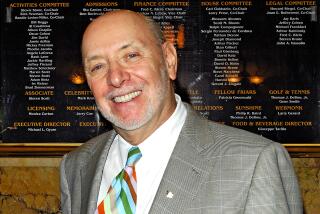Buchwald Going to Court Over ‘Coming to America’ : Lawsuit: The humorist and Paramount Pictures have failed to settle over his contention that the studio stole his original story. The high-profile suit comes to trial Thursday.
- Share via
In a trial that promises to give the public a rare glimpse into the highest levels of Hollywood wheeling and dealing, humorist Art Buchwald and producer Alain Bernheim are taking Paramount Pictures to court Thursday, a year after suing the film company for allegedly stealing Buchwald’s story concept to make the hit 1988 release “Coming to America,” starring Eddie Murphy.
The $5-million lawsuit filed by the Pulitzer Prize-winning newspaper columnist claims that Buchwald made a deal with Paramount in March, 1983, in which the studio was to develop two scripts from Buchwald’s “King for a Day.”
In the breach-of-contract action, Buchwald, a columnist with the Los Angeles Times Syndicate, claims that the plot of “Coming to America” came directly from his original concept. In addition to the $5 million in contract damages, the suit also seeks unspecified punitive damages from Paramount for allegedly plagiarizing his story. As released, the movie was credited as having been written by David Sheffield and Barry W. Blaustein from a story by Murphy.
The comedy, about an African prince who comes to New York to find a bride, grossed more than $128 million the year it was released, making it the third highest-grossing film of 1988 behind “Rain Man” ($171 million) and “Who Framed Roger Rabbit” ($154 million). With the continued influx of foreign revenues, videocassette sales and television licensing fees, “Coming to America’s” ultimate gross is expected to climb as high as the $300-million mark.
Attorneys for Paramount and Buchwald met for 2 1/2 hours Friday with Superior Court Judge R. William Schoettler Jr. in an attempt to settle the dispute before going to trial. Neither Buchwald’s attorneys nor a Paramount Pictures executive would comment on any progress as they emerged from the conference, but later in the day Buchwald’s attorneys filed a 76-page trial brief--a sign that they intend to proceed with trial as planned.
In the brief, Buchwald’s lawyers said that they intend to seek punitive damages against Paramount Pictures in order “to send a message throughout the entertainment industry that powerful motion picture studios may not option the original works of writers, use the works, disregard with impunity their obligations to pay for them, and then brazenly deny their misconduct in an arrogant display of conspicuous bad faith.”
According to papers filed in connection with the case, the showcase trial is expected to last two weeks and to bring Murphy to the witness stand, as well as such Hollywood heavyweights as Walt Disney Studios chairman Jeffrey Katzenberg (who was Paramount production president at the time “King for a Day” was optioned), “Coming to America” director John Landis, TV talk-show host and “Coming to America” co-star Arsenio Hall, former Paramount studio head Ned Tanen, Emmy Award-winning television producer-writer Danny Arnold and legendary film director Billy Wilder.
Under a stipulated gag order imposed by Los Angeles Superior Court Judge Harvey Schneider, attorneys for Paramount, Boccador Enterprises (Buchwald’s firm) and Alma Productions (Alain Bernheim’s production company) declined comment on the case last week.
According to Buchwald’s original 8-page treatment, which is contained in the court record, the columnist’s story tells of “an extremely wealthy, handsome and spoiled young African king named Josiah” from an oil-rich country who comes to Washington and is stuck there after losing his power and money to his brother in a coup staged during his absence. He winds up living in a ghetto, where he works for a caterer and falls for a woman who works for the State Department. He eventually returns to his native country and makes the woman his queen.
Murphy has said that he came up with the original idea for “Coming to America,” the tale of an African prince named “Akeem” who comes to New York, lives in an urban slum, gets a job at a fast-food restaurant, meets the girl of his dreams and returns to his native country, where he marries the girl.
Buchwald, who has written about 10 Hollywood screen treatments in the past, optioned “King for a Day” to Paramount, telling executives at the time that they could “change it, fold, spindle or mutilate it, but you have to pay me,” according to his suit. None of Buchwald’s previous treatments has ever became a movie.
After spending an estimated $500,000 to have screenwriters Tab Murphy and Francis Veber develop a script, Paramount’s management changed in late 1985, according to the suit, and the new executive team let the option on Buchwald’s story lapse.
Bernheim--whose production credits include such movies as “Buddy, Buddy,” “Racing With the Moon” and “Yes, Giorgio”--and another producer, Paul Maslansky (“Police Academy”), subsequently sold the story to Warner Bros. as “Me and the King.”
Warner Bros. spent an additional $200,000 in script development. But in a letter to Bernheim dated Jan. 20, 1988, Bruce Berman, vice president for theatrical production at Warner Bros, killed “Me and the King” when word surfaced that Paramount had a similar production scheduled for summer release. Berman’s letter was an exhibit attached to Buchwald’s original suit against Paramount.
The lawsuit says that under Buchwald’s lapsed contract with Paramount, the humorist was to have received a flat fee of $65,000 plus one half of 1% of net profits when “King for a Day” was produced. Bernheim was guaranteed a producer’s fee of $200,000 and 17.5% of the net profits under the same contract.
The only money Paramount ever paid the pair, according to their suit, was $42,500 during the two years that “King for a Day” was in development. They contend that they have received nothing from the bonanza spawned by the release of “Coming to America.”
But documents filed by Boccador as exhibits in the suit indicate that Paramount executives were using the Buchwald story to develop a movie for Murphy, about an African king who comes to America, within a few months of the day Paramount first optioned Buchwald’s story.
In a letter stamped “confidential” that then-Paramount production chief Katzenberg wrote to director Landis on July 1, 1983, Katzenberg detailed the story lines of 13 pending film projects that he wanted Landis to consider directing, including “King for a Day.” Katzenberg described the movie as:
”. . . a high-styled political satire inspired by Art Buchwald. The movie is intended for Eddie Murphy, who is familiar with the idea and likes it very much.”
Murphy, who did ultimately make “Coming to America” with Landis, vowed never to work with him again afterward but has refused to discuss their disagreement publicly.
In another confidential letter dated Dec. 12, 1983, Katzenberg similarly described “King for a Day” to NBC Entertainment president Brandon Tartikoff as an Eddie Murphy vehicle that Paramount planned to release in 1984:
“Eddie Murphy will star in this modern-day comedy about a (sic) aristocratic African king who comes to America only to lose his throne. Tossed out on the street without a dime, the deposed King is forced to abandon his regal attitudes and ‘get down with the brothers’ in a comedic, desperate effort to stay alive.”
Though Murphy is not named in the lawsuit because he was not party to the actual contract between Boccador Enterprises and Paramount, the actor has maintained both publicly and in sworn depositions that the story for “Coming to America” was his own.
“Eddie wrote the story 100%,” Murphy’s manager, Robert Wachs, told Associated Press last year.
Another set of letters filed as plaintiff’s exhibits in the case seems to indicate that Wachs had a different opinion about the origin of the story line five years ago, when Paramount was still developing “King for a Day.”
In a letter dated Sept. 7, 1984, novelist/poet Jim Harrison asked Wachs to consider a two-page film treatment for Murphy about an Ethiopian prince who swaps identities with a look-alike aide to a U.S. Senator.
In his Sept. 10, 1984, reply to Harrison, Wachs turned the novelist down with this explanation:
“Unfortunately, there is a project already under development at Paramount for Eddie entitled ‘King for a Day,’ based on an unpublished Art Buchwald story, which is fairly close to your story line, hence I really can’t give you a go-ahead on this one.”
More to Read
The biggest entertainment stories
Get our big stories about Hollywood, film, television, music, arts, culture and more right in your inbox as soon as they publish.
You may occasionally receive promotional content from the Los Angeles Times.










